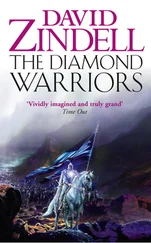David Gibbins - The Tiger warrior
Здесь есть возможность читать онлайн «David Gibbins - The Tiger warrior» весь текст электронной книги совершенно бесплатно (целиком полную версию без сокращений). В некоторых случаях можно слушать аудио, скачать через торрент в формате fb2 и присутствует краткое содержание. Жанр: Прочие приключения, на английском языке. Описание произведения, (предисловие) а так же отзывы посетителей доступны на портале библиотеки ЛибКат.
- Название:The Tiger warrior
- Автор:
- Жанр:
- Год:неизвестен
- ISBN:нет данных
- Рейтинг книги:4 / 5. Голосов: 1
-
Избранное:Добавить в избранное
- Отзывы:
-
Ваша оценка:
- 80
- 1
- 2
- 3
- 4
- 5
The Tiger warrior: краткое содержание, описание и аннотация
Предлагаем к чтению аннотацию, описание, краткое содержание или предисловие (зависит от того, что написал сам автор книги «The Tiger warrior»). Если вы не нашли необходимую информацию о книге — напишите в комментариях, мы постараемся отыскать её.
The Tiger warrior — читать онлайн бесплатно полную книгу (весь текст) целиком
Ниже представлен текст книги, разбитый по страницам. Система сохранения места последней прочитанной страницы, позволяет с удобством читать онлайн бесплатно книгу «The Tiger warrior», без необходимости каждый раз заново искать на чём Вы остановились. Поставьте закладку, и сможете в любой момент перейти на страницу, на которой закончили чтение.
Интервал:
Закладка:
“And with the legion a hollow memory, there are no checks, no controls,” Costas said.
Jack nodded. “Some of these guys in the late republic saw much more action than the professional legionaries of the empire, and the idea of their civilian lives, their jobs, became a kind of myth. But if you spend your life killing, who knows where the boundaries are? When the time comes, if it ever does, how do you know when to stop being a soldier, and become a citizen again?”
“An age-old problem,” Hiebermeyer murmured.
“If they did escape, word would have passed on the Silk Route,” Jack said. “That was bandit country, but even there the Romans’ reputation would have preceded them. You would not have wanted to encounter these guys.”
“What about the Silk Route?” Costas asked. “Are there any more inscriptions?”
“Katya’s spent the last couple of seasons roaming the mountains and passes of central Asia, searching. A lot of it’s still unexplored territory.”
“And still bandit country,” Hiebermeyer said.
“I seem to remember Katya knows how to use a Kalashnikov,” Costas murmured.
Jack opened his notebook again. “A few months ago she hit pay dirt at a place called Cholpon-Ata, on the western shore of Lake Issyk-Kul in Kyrgyzstan. That’s hundreds of miles east along the northern Silk Route from the place with the Fifteenth Legion inscription, on the edge of the Tien Shan Mountains and the pass that leads down to the Taklamakan Desert and China. For years now archaeologists have known about this place, a desolate boulder-strewn landscape where there are hundreds, probably thousands of petroglyphs, shallow-cut rock carvings of ibexes, other animals, hunters. Most were carved by Scythian nomads. But it would also have been a staging post along the Silk Route for traders who had survived the trek from the west, and before embarking on boats toward China.”
“How big is the lake?” Rebecca asked.
“It’s the second biggest mountain lake in the world after Lake Titicaca. There are many stories of sunken settlements, of treasure. There’s a lot to be found. The Soviets used the lake as a submarine and torpedo testing site.”
“Can we go?” Rebecca said. “I want to meet Katya.”
Jack smiled. “It’s on the cards. Last year, Katya stumbled across a boulder there that might have an inscription on it. The boulder was almost entirely buried, and the permit for an excavation had only just come through at the time of the conference. She’s out there now.”
“Not alone, I hope,” Aysha said.
“She has Kyrgyz collaboration,” Jack said. “That means one guy and a creaky old tractor, as far as I can tell.”
“You’ve spoken to her recently?” Costas eyed Jack.
“This morning.”
Costas grunted. “So we might be able to join some dots.”
“There’s another thing. A really fascinating idea.”
“Fire away.”
“Well, the dots might not just lead east. They might also throw a curveball south.”
“Map, Jack,” Costas said.
Aysha reached over and unrolled a map of the world on the chart table. Jack traced out the features as he talked. “The Silk Route goes west-east, from Merv in Parthia to Xian in China, through the mountains of central Asia. Lake Issyk-Kul lies at the northeastern end of that massif with only one major pass to go before you get to China. But you can also leave the route along the way and break off south. If you do that from Lake Issyk-Kul, you’ve got a huge mass of mountains to get through, really forbidding places, through eastern Afghanistan, but then you break into northern Pakistan and the jungles of India. From there, if you’re a traveler from the west in the first century BC, the Roman world is within reach again.”
Costas’ eyes narrowed. “Are you suggesting that escaped Roman prisoners may have gone that way?”
Jack paused. “One of Katya’s colleagues, a man named Hai Chen, is an independent scholar based in Xian who’s made a lifelong study of the Roman connection. He encouraged Katya to explore Kyrgyzstan, the petroglyphs at Issyk-Kul. He believes passionately in the story of Crassus’ lost legionaries, but with a twist. He’s originally a linguist, an expert on analyzing foundation stories and mythology among peoples with a strong oral tradition. As a young man he spent several years in Chitral, a kind of Shangri-la in northeastern Pakistan, the first place you’d come to after breaking through the mountains from the north.”
“The people who believe they’re descended from Alexander the Great,” Hiebermeyer murmured.
“The mythologies of the region-Vedic, Hindu, Buddhist-are full of stories of travelers from afar, princes, pilgrims, holy men dispensing wisdom. Sometimes they’re on a quest, or princes on a transformative journey, like Buddha himself Imagine the Canterbury Tales, Sir Gawain and the Green Knight, Hercules’ Labors, Moses in the desert. Sometimes the arrival fulfills a local prophecy, and the traveler becomes king.”
“Didn’t Fa-hsien come through the mountains?” Hiebermeyer asked.
Jack nodded, and glanced at Costas. “A Chinese Buddhist monk who came to India in the early fifth century AD in search of the holy texts of his religion. His Records of the Buddhistic Kingdoms is one of the great early travel books. He came to Gandhara, the ancient Buddhist state of northern India. But Katya’s colleague Hai Chen wasn’t on the trail of a Buddhist monk. He’d heard of someone else. The traveler he recorded from the oral stories was a yavana, meaning westerner. And this yavana was no monk but a warrior, one who ruled with a golden hand. He came to Chitral for a short time, and then left. Farther south Hai Chen heard another legend of a god-king called Haljit Singh, Tiger Hand. He too left, and went south.”
“Where are we leading with this?” Costas said.
“If you’re our Roman, once you get through the mountains of Afghanistan, past Chitral, the way’s open to the west. You have two options. You can travel down the valley of the Indus southwest to the head of the Indian Ocean, to the port of Barygaza, near modern Karachi in Pakistan. From there you can sail to Arabia, then the Red Sea toward home. But there was another option. If you want to make contact with fellow yavanas, with other Romans in India, the better route was to go southeast, down the valley of the Ganges to the Bay of Bengal. You’d end up passing extensive tracts of jungle in eastern India. Look at the travels of the monk Fa-hsien. He took that route, and sailed south all the way to Sri Lanka. Then look at the Periplus. It describes the same route, just looking in the opposite direction. Listen to this.” Jack picked up the modern edition of the Periplus on the table, and flicked through it until he came to the page he was looking for. “After this, toward the east and with the ocean on the right, sailing offshore past the remaining lands on the left, you come upon the land of the Ganges; in this region is a river, itself called the Ganges, that is the greatest of all the rivers in India, and which rises and falls like the Nile.” Jack gestured toward the porthole, where the shore was just visible. “Remember, the author of the Periplus was recalling being here off southern India, looking north. It was probably as far as he ever came. But he knows men who’ve come down from there, maybe Indian middlemen from Gandhara, maybe even traders who have come all the way down from central Asia-Bactrians, Sogdians, even western Han Chinese.”
“The kind of trader who would have told our yavana, our escaped Roman, which way to go,” Aysha said.
“But probably not lived long enough to guide him there,” Jack said. “All a Roman legionary needed was a pair of stout marching sandals and a clear view of the sun and stars. With that, he was set. A guide would never have kept up with him.”
Читать дальшеИнтервал:
Закладка:
Похожие книги на «The Tiger warrior»
Представляем Вашему вниманию похожие книги на «The Tiger warrior» списком для выбора. Мы отобрали схожую по названию и смыслу литературу в надежде предоставить читателям больше вариантов отыскать новые, интересные, ещё непрочитанные произведения.
Обсуждение, отзывы о книге «The Tiger warrior» и просто собственные мнения читателей. Оставьте ваши комментарии, напишите, что Вы думаете о произведении, его смысле или главных героях. Укажите что конкретно понравилось, а что нет, и почему Вы так считаете.












